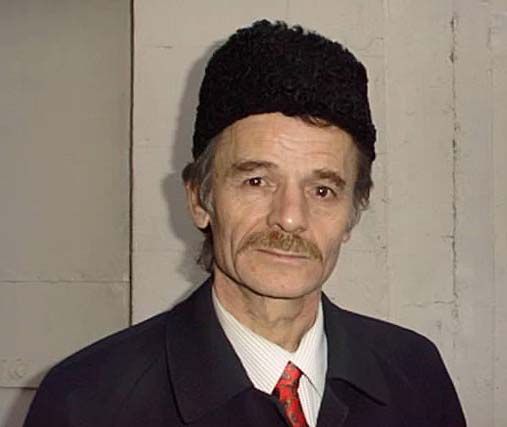Mustafa Abdulcemil Kirimoglu
(Mustafa Cemiloglu or Jemilev)
 The leader of the Crimean Tatar National Movement, Mustafa Abdulcemil
Kirimoglu was born in 1943 as Mustafa Cemiloglu. In May l944,
the Soviet troops rounded up the entire Crimean Tatar population,
consisting mostly women, children, and elderly (about 250,000 people)
iand deported them to Central Asia. Men were taken directly
from the front and sent into exile. Like all Crimean Tatars, the Cemiloglu
family lived under tight police surveillance until l955,
when some restrictions like the curfew were relaxed.
The leader of the Crimean Tatar National Movement, Mustafa Abdulcemil
Kirimoglu was born in 1943 as Mustafa Cemiloglu. In May l944,
the Soviet troops rounded up the entire Crimean Tatar population,
consisting mostly women, children, and elderly (about 250,000 people)
iand deported them to Central Asia. Men were taken directly
from the front and sent into exile. Like all Crimean Tatars, the Cemiloglu
family lived under tight police surveillance until l955,
when some restrictions like the curfew were relaxed.
In l96l, Cemiloglu joined the underground "Union of Crimean Tatars Youths,"
and became one of the most active dissidents in the Soviet Unions.
He would eventually lead the only sustained mass movement in the history
of the Soviet Union, the Crimean Tatars' fight for their most basic civil
right to return to their homeland from which they were forcibly deported.
For his activities, Cemiloglu was expelled from Tashkent Hydroelectric
Institute, and in 1966 sentenced to prison for a year and a half for refusing
military service in the Soviet Army. While in prison, he
was accused of anti-Soviet propaganda and went on his first hunger strike.
After his release from prison, he established contact with dissidents
throughout the Soviet Union, and in l969 he co-founded, with Andrei Sakharov
among others, the "Initiative Group in Defense of Human Rights in the USSR."
The same year, he was arrested again for anti-Soviet propaganda and sentenced
to prison for three years. From l972-l974, he lived under KGB surveillance
in Uzbekistan, while working on a state farm. Rearrested in l974, he was
sentenced to a year in a hard-labor camp for attempting to hand President
Nixon a petition on behalf of the Crimean Tatars. The authorities transferred him
to prison for distributing alleged anti-Soviet propaganda among the prisoners.
It was there that he went on one of the longest known hunger strikes in the history
of dissidence -- 303 days. In April l976, Cemiloglu was again sentenced for
dissident activities to hard-labor camp, and later deported to Tashkent
where he remained under KGB surveillance. He was rearrested in early l979,
and sentenced to five and a half years in prison. In November l983,
the Soviet authorities arrested him for the sixth time and sentenced him
to three years in a camp in the Magadan region.
While still in exile, Cemiloglu was elected to the Central Initiative
Group of the Crimean Tatars in l987. Two years later, he moved with his family
to Bakhchisaray in Crimea, leading a movement that resulted in the return
of 250,000 Crimean Tatars to their homeland. In l99l, and again l996,
Cemiloglu was elected as the chairman of the Crimean Tatar National Mejlis
(governing council or assembly). In 1991, at a national gathering (Kurultay)
he was given the name of Kirimoglu (son of Crimea) to honor his exceptional courage and leadership in
the Crimean struggle for civil rights. About 250,000 Crimean Tatars still
live in exile in Central Asia.
CREDITS: The above biographical information about Mustafa Kirimoglu was provided by Irena Lasota of IDEE, Washington, DC.
Digital photo by Inci Bowman, Washington, DC.
See also:
The Crimean Tatars' Thorny Path to Their Homeland by M.A. Kirimoglu
Interview with M. Cemiloglu, 1992
Interview with M. Cemiloglu, 1994
My Impressions of Mustafa Jemilev by S. Badretdin

 The leader of the Crimean Tatar National Movement, Mustafa Abdulcemil
Kirimoglu was born in 1943 as Mustafa Cemiloglu. In May l944,
the Soviet troops rounded up the entire Crimean Tatar population,
consisting mostly women, children, and elderly (about 250,000 people)
iand deported them to Central Asia. Men were taken directly
from the front and sent into exile. Like all Crimean Tatars, the Cemiloglu
family lived under tight police surveillance until l955,
when some restrictions like the curfew were relaxed.
The leader of the Crimean Tatar National Movement, Mustafa Abdulcemil
Kirimoglu was born in 1943 as Mustafa Cemiloglu. In May l944,
the Soviet troops rounded up the entire Crimean Tatar population,
consisting mostly women, children, and elderly (about 250,000 people)
iand deported them to Central Asia. Men were taken directly
from the front and sent into exile. Like all Crimean Tatars, the Cemiloglu
family lived under tight police surveillance until l955,
when some restrictions like the curfew were relaxed.
